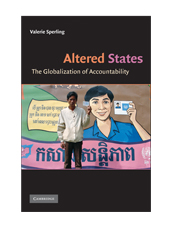Book contents
- Frontmatter
- Contents
- Acknowledgments
- 1 Transnational Institutions and Accountability
- 2 For Richer, for Poorer: Economic Globalization
- 3 Democracy from Abroad? Political Globalization
- 4 Army for Hire: Transnational Military Forces
- 5 Trials and Tribulations: Transnational Judicial Institutions
- 6 My Country Is the Whole World: Transnational Civil Society
- 7 Conclusion: Altered States and Altered Citizens
- Bibliography
- Index
3 - Democracy from Abroad? Political Globalization
Published online by Cambridge University Press: 19 January 2010
- Frontmatter
- Contents
- Acknowledgments
- 1 Transnational Institutions and Accountability
- 2 For Richer, for Poorer: Economic Globalization
- 3 Democracy from Abroad? Political Globalization
- 4 Army for Hire: Transnational Military Forces
- 5 Trials and Tribulations: Transnational Judicial Institutions
- 6 My Country Is the Whole World: Transnational Civil Society
- 7 Conclusion: Altered States and Altered Citizens
- Bibliography
- Index
Summary
An election is typically thought of as a national affair. Yet even elections and their organization are increasingly borderless phenomena. From providing election monitoring (which often complements, rather than supplants, indigenous monitoring organizations and civic groups), to conducting elections, and beyond, international organizations have stepped into ever more extensive roles in countries struggling to move from dictatorship toward democracy.
Bilateral (government-to-government) “political” aid played a backstage role during the Cold War, as the superpowers competed for the affections of Third World leaders and military basing rights. It was only in the post–Cold War era that the United Nations and other transnational political organizations such as the Organization for Security and Cooperation in Europe (OSCE) adopted an increasingly open policy of democracy promotion. By 1990, the shift toward increased (and normatively accepted) transnational participation in elections was in evidence. At that time, the UN began to experience an exponential increase in requests for election monitoring “from governments that felt compelled to prove their legitimacy by the new standards” – suggesting that the UN had come to be seen as a legitimator in the world of increasingly intrusive transnational institutions. It is in this context that the role of supranational political institutions grew, making possible an unprecedented level of transnational political intervention in a handful of struggling states.
Two dramatic cases of such “political globalization” will be discussed here; the first took place in the early 1990s in Cambodia, and the second in Bosnia some years later, in the wake of Yugoslavia's collapse.
- Type
- Chapter
- Information
- Altered StatesThe Globalization of Accountability, pp. 106 - 156Publisher: Cambridge University PressPrint publication year: 2009



